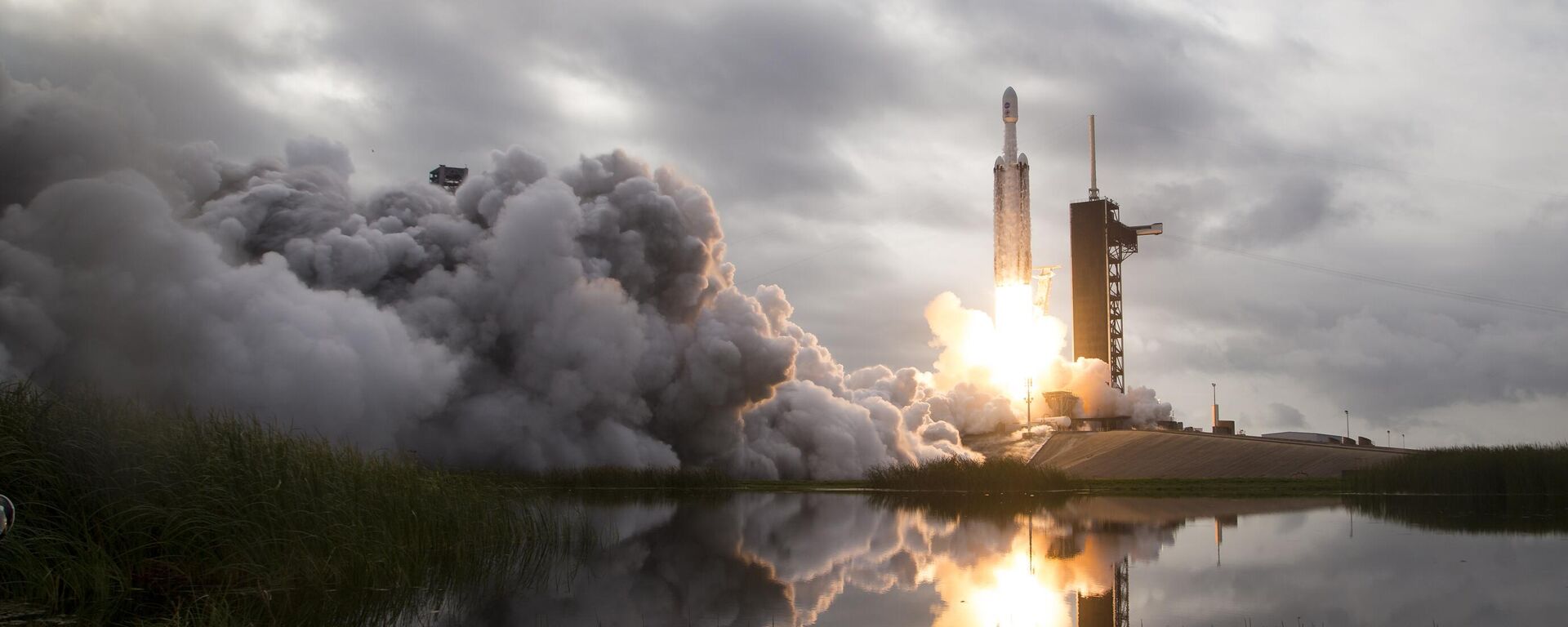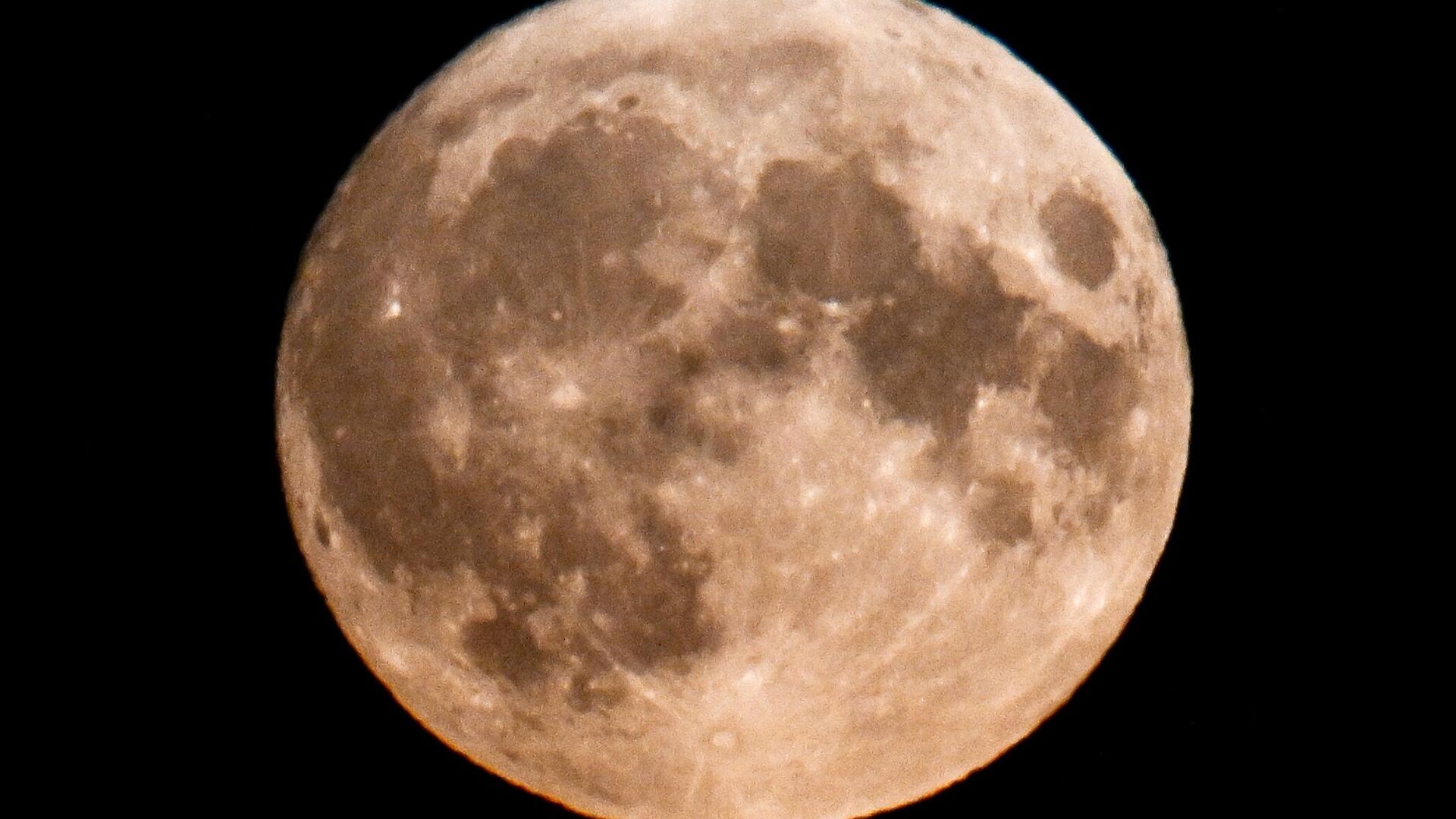https://sputnikglobe.com/20240107/astronomers-warn-moons-resources-could-be-destroyed-by-exploitation-1116022480.html
Astronomers Warn Moon's Resources Could be Destroyed by Exploitation
Astronomers Warn Moon's Resources Could be Destroyed by Exploitation
Sputnik International
The Moon could be badly exploited and suffer irreversible damage, astronomers said, in an effort to caution those who wish to survey the lunar landscape. Dozens of probes are gearing up to do so over the next few years.
2024-01-07T01:54+0000
2024-01-07T01:54+0000
2024-01-07T01:54+0000
world
moon
nasa
space exploration
moon landing
space research
mineral resources
space colonization
colonization
mars colonization
https://cdn1.img.sputnikglobe.com/img/07e7/08/1f/1113008688_0:109:2096:1288_1920x0_80_0_0_6e917915256ecacc04009f5969e33f5e.jpg
The Moon could be badly exploited and suffer irreversible damage, astronomers said, in an effort to caution those who wish to survey the lunar landscape. Dozens of probes are gearing up to do so over the next few years.Series of Moon explorers are being largely funded through NASA’s $2.6 billion Commercial Lunar Payload Services (CLPS) initiative. CLPS contracts allow NASA to work alongside private American companies in order to “deliver science and technology to the lunar surface”, according to their website. The companies “bid on delivering payloads for NASA”, and beginning in 2023, commercial deliveries will “perform science experiments, test technologies, and demonstrate capabilities to help NASA explore the Moon as it prepares for human missions.”For example: just this week, the Peregrine mission one was announced to be preparing for its launch on Monday, making it the first US Moon lander since Apollo. The mission will aim to locate water molecules on the Moon, measure radiation and gasses around the lander, and evaluate the lunar exosphere, according to NASA.But some astronomers are cautioning the excitement by warning that unrestricted access to the Moon’s resources could cause irreversible damage, and could upend future research opportunities.Professor Richard Green, an astronomer from the University of Arizona, echoed those sentiments, adding: “We are not trying to block the building of lunar bases. However, there are only a handful of promising sites there and some of these are incredibly precious scientifically. We need to be very, very careful where we build our mines and bases.”These craters could be used to house tools like infra-red telescopes which are required to be cooled constantly. But these craters could also contain water in the form of very cold ice that failed to evaporate in the early stages of the Moon’s life. Therefore, these seas of ice could hold information about how and when water arrived both on the Moon---as well as on Earth.But lunar pole water, as well as many of the minerals found there, could be easily taken from by colonists and used for the construction of permanent bases on the Moon.Plans to create a legislature to protect interplanetary resources may go into effect later this month. A working group created by the International Astronomical Union is planning to meet UN officials to begin negotiations, according to one report.A 2018 study brought by ESA predicts that between $73 and $170 billion in revenue could be generated annually from the exploitation of celestial resources until 2045. Global powers may also have vested interests in lunar resources, such as helium-3 which is a key component of nuclear fusion.International treaties created during the Cold War prohibit the national appropriation of outer space, the Moon, and other celestial bodies. However, just because they don’t “belong” to any particular party or group, does not mean they cannot be exploited. Rafael Harillo, a lawyer, defines the problem succinctly: “The sea belongs to everyone and the fish belongs to [the people] who catch them.”The Artemis Accords have already been signed by 33 countries, after first being launched in October of 2020 under the Donald Trump administration. The agreement', which drew from the 1967 Outer Space Treaty, hopes to return humans to the Moon by 2025. This multilateral agreement contemplates and justifies the extraction of resources, explained one lawyer, without implying “intrinsically national appropriation,” meaning: when “nations engage in mining activities on the Moon, they do not obtain property rights over the extracted materials”. But the accords are not legally binding, and have received heated criticism for being too US-centered. The accords also do little to prevent private companies from mining precious resources.
https://sputnikglobe.com/20231208/fifty-us-commercial-space-launches-failed-since-2000-resulting-in-12-loss---report-1115467718.html
https://sputnikglobe.com/20231130/mark-your-calendar-us-looks-to-make-first-lunar-visit-in-decades-by-2024-1115313663.html
Sputnik International
feedback@sputniknews.com
+74956456601
MIA „Rossiya Segodnya“
2024
News
en_EN
Sputnik International
feedback@sputniknews.com
+74956456601
MIA „Rossiya Segodnya“
Sputnik International
feedback@sputniknews.com
+74956456601
MIA „Rossiya Segodnya“
moon, space exploration, space mining, us, nasa, artemis accords, space treaty, space exploitation, space travel, moon's resources, moon resources, moon landing, moon colonization, colonization of moon, space resources
moon, space exploration, space mining, us, nasa, artemis accords, space treaty, space exploitation, space travel, moon's resources, moon resources, moon landing, moon colonization, colonization of moon, space resources
Astronomers Warn Moon's Resources Could be Destroyed by Exploitation
The European Space Agency (ESA) predicts that between $73 and $170 billion in revenue could be generated annually from the exploitation of celestial resources until 2045—or, until they run out.
The Moon could be badly exploited and suffer irreversible damage, astronomers said, in an effort to caution those who wish to survey the lunar landscape. Dozens of probes are gearing up to do so over the next few years.
Series of Moon explorers are being largely funded through NASA’s $2.6 billion Commercial Lunar Payload Services (CLPS) initiative. CLPS contracts allow NASA to work alongside private American companies in order to “deliver science and technology to the lunar surface”, according to their website. The companies “bid on delivering payloads for NASA”, and beginning in 2023, commercial deliveries will “perform science experiments, test technologies, and demonstrate capabilities to help NASA explore the Moon as it prepares for human missions.” For example: just this week, the Peregrine mission one was announced to be preparing for its launch on Monday, making it the first US Moon lander since Apollo. The mission will aim to locate water molecules on the Moon, measure radiation and gasses around the lander, and evaluate the lunar exosphere, according to
NASA.
But some astronomers are cautioning the excitement by warning that unrestricted access to the Moon’s resources could cause irreversible damage, and could upend future research opportunities.
“The issue has become urgent,” said Martin Elvis, of the Center for Astrophysics, Harvard & Smithsonian. “We need to act now because decisions made today will set the tone for our future behavior on the Moon.”

8 December 2023, 00:14 GMT
Professor Richard Green, an astronomer from the University of Arizona, echoed those sentiments, adding: “We are not trying to block the building of lunar bases. However, there are only a handful of promising sites there and some of these are incredibly precious scientifically. We need to be very, very careful where we build our mines and bases.”
“A few deep lunar craters have been discovered to have been shrouded in shadow since the Moon formed billions of years ago. Sunlight has never reached their floors and so they are unbelievably cold – probably only a few dozen degrees above absolute zero. And that makes them scientifically very valuable,” Green explained.
These craters could be used to house tools like infra-red telescopes which are required to be cooled constantly. But these craters could also contain water in the form of very cold ice that failed to evaporate in the early stages of the Moon’s life. Therefore, these seas of ice could hold information about how and when water arrived both on the Moon---as well as on Earth.
But lunar pole water, as well as many of the minerals found there, could be easily taken from by colonists and used for the construction of permanent bases on the Moon.
Plans to create a legislature to protect interplanetary resources may go into effect later this month. A working group created by the International Astronomical Union is planning to meet UN officials to begin negotiations, according to one
report.
A 2018
study brought by ESA predicts that between $73 and $170 billion in revenue could be generated annually from the exploitation of celestial resources until 2045. Global powers may also have vested interests in lunar resources, such as helium-3 which is a key component of nuclear fusion.
“The trouble is that it takes a long time to make changes to UN treaties, so we have to act now if we are to have a hope of making sure we have international agreements in place to protect the unique scientific features of the Moon and ensure they are not destroyed through thoughtless exploitation,” said Green, who is heading the working group.

30 November 2023, 22:19 GMT
International treaties created during the Cold War prohibit the national appropriation of outer space, the Moon, and other celestial bodies. However, just because they don’t “belong” to any particular party or group, does not mean they cannot be exploited. Rafael Harillo, a lawyer, defines the problem succinctly: “The sea belongs to everyone and the fish belongs to [the people] who catch them.”
The Artemis Accords have already been signed by 33 countries, after first being launched in October of 2020 under the
Donald Trump administration. The agreement', which drew from the 1967 Outer Space Treaty, hopes to return humans to the Moon by 2025.
This multilateral agreement contemplates and justifies the extraction of resources, explained one lawyer, without implying “intrinsically national appropriation,” meaning: when “nations engage in mining activities on the Moon, they do not obtain property rights over the extracted materials”. But the accords are not legally binding, and have received heated criticism for being too US-centered. The accords also do little to prevent private companies from mining precious resources. 



